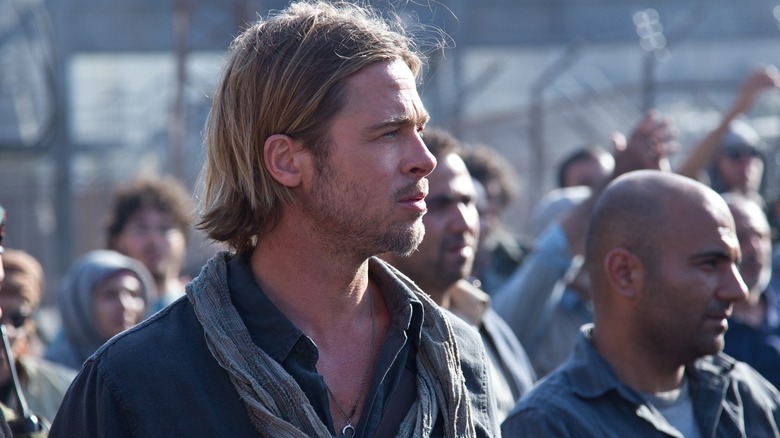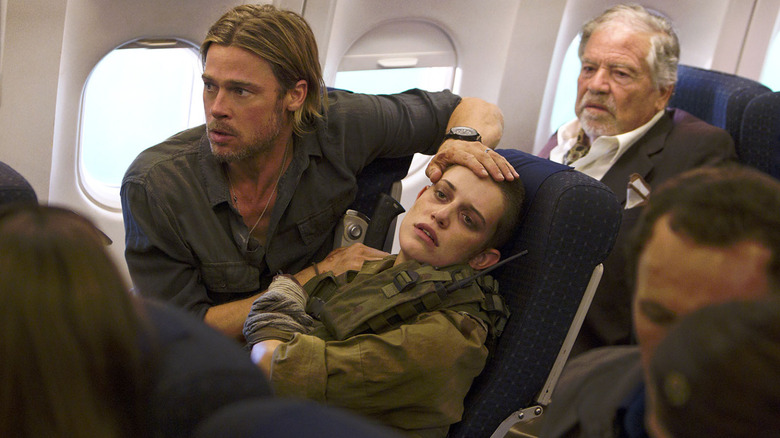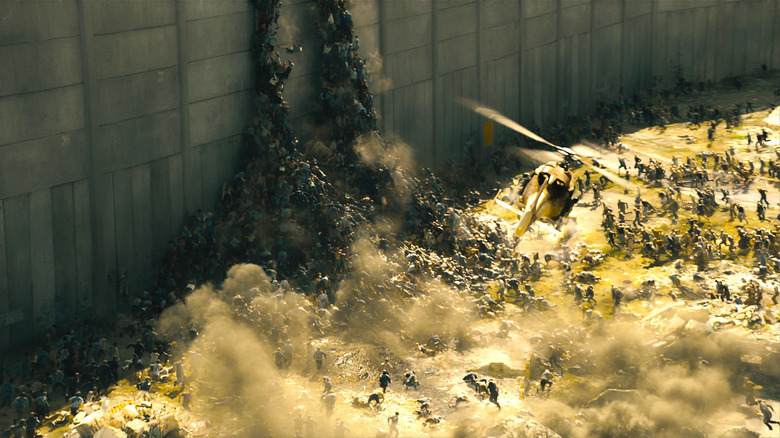Is The World War Z Sequel Still Happening Or Is The Zombie Apocalypse Over?
In the years leading up to its release in 2013, all signs pointed to "World War Z" becoming an epic disaster. First, there was the furor over its script, which went through multiple drafts written by Matthew Michael Carnahan and J. Michael Straczynski (who wound up sharing story credit), along the way transforming Max Brooks' inventive source material — a fictional oral history of a zombie apocalypse comprised of accounts from multiple survivors — into what read on paper as a milquetoast "A-lister saves the world" tentpole. Then came the news that the film would be reshooting more or less its entire third act, causing its budget to further balloon and delaying its release date by six months.
Unsurprisingly, the final movie result is a Frankenstein's creation that plays as a bombastic zombie action flick for its first two-thirds before abruptly changing into a much more low-key (and, frankly, better) survival horror thriller for the remainder of its runtime. It sort of works, too, despite the patchy filmmaking ... or, at the very least, it's not relentlessly in conflict with itself from one scene to the next like certain other Frankenstein-ed tentpoles. Paramount's decision to overhaul the film even paid off at the box office, with "World War Z" becoming the highest-grossing zombie movie of all time and the studio confirming plans for a follow-up not long after.
10 years later, however, a proposed sequel reuniting "World War Z" star Brad Pitt with his "Se7en," "Fight Club," and "The Curious Case of Benjamin Button" director David Fincher has seemingly fallen by the wayside. So, what went wrong, and is there any chance of the project coming back from the dead? (Yeah, I went there, and I'm not sorry.) Let's get into it, shall we?
Why hasn't World War Z 2 happened yet?
Before the film's many production woes, Paramount envisioned "World War Z" as the start of a trilogy of films. Each of them would have centered on Pitt's character, the former UN investigator Gerry Lane, battling not just the infected but also the dangerous global sociopolitical changes that emerge in the wake of the zombie pandemic. (Imagine a political action-thriller in the vein of the "Bourne" movies crossed with "The Walking Dead," to paraphrase a 2012 report by the Los Angeles Times.) You can see, then, why the studio initially recruited "The Orphanage" and "The Impossible" director Juan Antonio Bayona to helm the sequel, wanting someone who could do equal justice by both the film's human horror drama and all the zombie-related spectacle around it.
After Bayona departed the sequel in 2016 due to creative differences, Fincher entered talks to replace him. From the get-go, though, it was difficult to imagine a director known for making "feel-bad" adult dramas and crime-thrillers helming something as crowd-pleasing as a "World War Z" sequel. Fincher was clearly in no rush to make the film, either, and spent the next couple of years overseeing script revisions rather than charging head-first into production (not that anyone expected anything less from the notoriously perfectionist filmmaker). But by early 2019, Fincher had stepped away from the sequel to focus his attention on producing and directing Netflix's "Mindhunter" series, at which point the "World War Z" sequel was reported to have been unofficially canceled.
Everything David Fincher has said about World War Z 2
It's worth clarifying that the question was never whether Fincher could have made a terrific "World War Z" sequel (he absolutely could have); it was whether Paramount would ever sign off on his undoubtedly dark and cynical vision for the zombie film. Having previously gone through a terrible experience making "Alien 3" earlier in his career, Fincher was naturally adamant about getting all his ducks in a row before taking on yet another big-budget horror franchise sequel. "We're hoping to get a piece of material that's a reason to make a movie, not an excuse to make a movie," he explained on the Empire Podcast in 2017.
Speaking with Little White Lies later that same year, Fincher also had this to say on the matter:
"[The] 'World War Z' [sequel]? We're trying. A lot of stones have been laid. We're just deconstructing it right now against the mythology that exists to see where we can go."
Paramount, on its end, was apparently just as reluctant to charge into a "World War Z" sequel without a finalized game plan as Fincher after what happened with the first film. In 2019, a source for The Hollywood Reporter claimed "China's zombie film ban is the single biggest reason" the studio allowed "World War Z 2" to die a quiet death after Fincher drifted away, which seems plausible enough given how dependent Hollywood studios had become on the Chinese box office right before COVID-19 changed everything (see also: why previously-announced Chinese co-productions like "Need for Speed 2" have since been abandoned). But honestly? Without a slam-dunk idea and actor-director pairing in place, that might have simply been the final straw that convinced Paramount this zombie sequel was already more trouble than it's worth.


